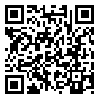BibTeX | RIS | EndNote | Medlars | ProCite | Reference Manager | RefWorks
Send citation to:
URL: http://rehabilitationj.uswr.ac.ir/article-1-1483-en.html
Objective: One of the most important issues in the development of fundamental motor skills in the early years of life is development of fine and gross motor skills. The aim of this study was fine and gross motor skills assessment and the relationship between some anthropometric indices and environmental factors with the development of fine and gross motor skills in preschool children that aged 3-6 in north of Tehran,2014.
Materials & Methods: The research society was Tehran’s first and second areas preschools. Four preschools were selected based on availability and 206 children (girls and boys) participated voluntary. Data were collected from the family information questionnaires and Denver development test type 2.
Results: On average, only 56/06 percent of children in gross motor skills and 77/56 percent of children in fine motor skills were in normal and developed conditions. But 23/86 percent of children in gross motor skills and 14/9 percent of children in fine motor skills were at caution and 12/83 percent of children in gross motor skills and 7/56 percent of children in fine motor skills were exposed to delayed development delays in performance. There was a significant correlation among some of the anthropometric indices such as shoulder, hip and arm length, waist, chest circumference and the performance of some gross motor skills such as jumping, hoping, throwing. Among environmental factors, factors like watching television time and sleeping time affected children's kicking.
Conclusion: A noticeable number of children who participated in this study had poor gross motor skills, thus strengthening and improving these skills required to specific attention and planning.
Received: 2/03/2014 | Accepted: 17/06/2014 | Published: 22/12/2014
| Rights and permissions | |
 |
This work is licensed under a Creative Commons Attribution-NonCommercial 4.0 International License. |





